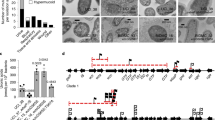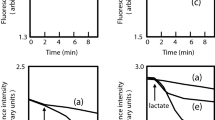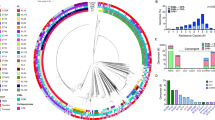Abstract
SPONTANEOUS antibiotic-resistant mutants that arise in bacterial populations are usually only resistant to the particular antibiotic used in the culture medium used for their isolation. In the experiments described here, however, mutants of Klebsiella pneumoniae resistant to chloramphenicol, sodium nalidixate and trimethoprim, three unrelated antibiotics, were obtained by including any one of the antibiotics in the culture medium. Because these multiply resistant mutants were commonly found in the alimentary tract of animals experimentally infected with antibiotic-sensitive K. pneumoniae and then fed on antibiotic-containing diets they may be clinically important.
This is a preview of subscription content, access via your institution
Access options
Subscribe to this journal
Receive 51 print issues and online access
$199.00 per year
only $3.90 per issue
Buy this article
- Purchase on Springer Link
- Instant access to full article PDF
Prices may be subject to local taxes which are calculated during checkout
Similar content being viewed by others
Author information
Authors and Affiliations
Rights and permissions
About this article
Cite this article
SMITH, H. Mutants of Klebsiella pneumoniae resistant to several antibiotics. Nature 259, 307–308 (1976). https://doi.org/10.1038/259307a0
Received:
Accepted:
Issue Date:
DOI: https://doi.org/10.1038/259307a0
This article is cited by
-
Trimethoprim and other nonclassical antifolates an excellent template for searching modifications of dihydrofolate reductase enzyme inhibitors
The Journal of Antibiotics (2020)
-
Multiantibiotic resistance caused by active drug extrusion in hospital pathogens
Journal of Infection and Chemotherapy (1997)
-
The emergence of antibiotic resistance: Myths and facts in clinical practice
Intensive Care Medicine (1990)
Comments
By submitting a comment you agree to abide by our Terms and Community Guidelines. If you find something abusive or that does not comply with our terms or guidelines please flag it as inappropriate.



